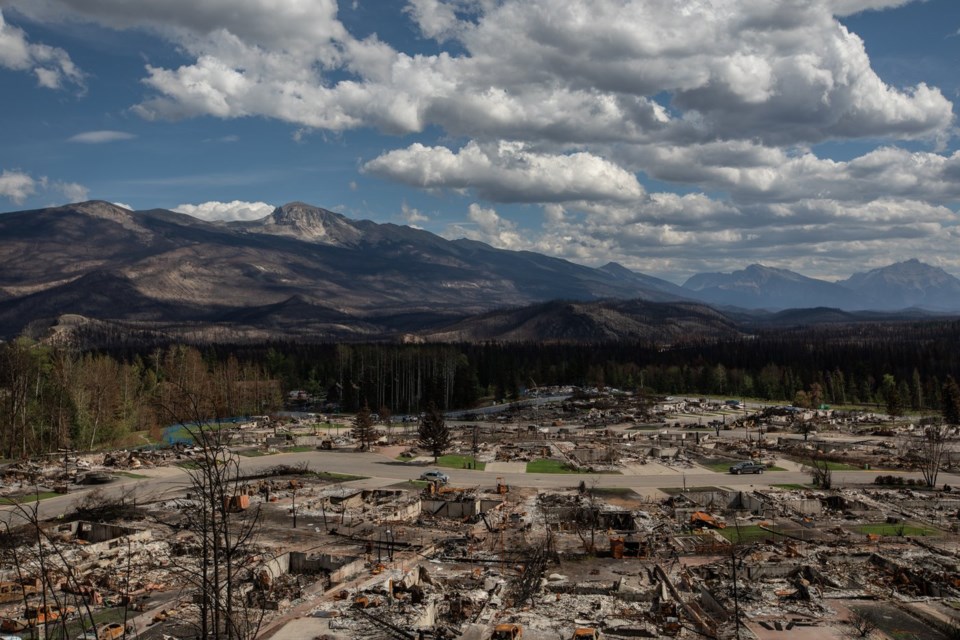JASPER, ALBERTA — A bright green Welcome Home banner still hangs on the awning of Nesters Market on the main drag in Jasper, Alta.
It's been three months since residents were allowed to return to the Rocky Mountain tourist town, after a devastating wildfire hit the national park and scorched one-third of the community's homes and businesses. An estimated 2,000 people were displaced.
A construction site on the east edge of town, one of four where crews are working overtime to put up quick-form housing, was briefly covered in snow Friday. Many snowfalls are expected to blanket the area over the next few months.
The new public housing, which is costing the province $112 million, isn't expected to be ready for renters until spring.
On the west side of town, blue wire fencing with asbestos warning signs protects passersby from a grey expanse of burnt out vehicles and what's left of entire blocks of single family homes and what used to be gas stations and hotels.
Debris removal is ongoing as insurance claims get settled, but those fences aren't expected to come down any time soon.
In the middle of town, largely spared by the fire, life goes on.
The laughing and crying of children during school recess rings loud, coffee shops bustle with catch-up chatter and those taking advantage of free internet, and tourists walk slowly with sticker-covered water bottles advertising where else they've been.
Jasper's long-tenured mayor, Richard Ireland, estimates between 60 and 70 per cent of the town's 5,000 residents are back home.
Whether the remaining residents have chosen not to come back or can't because they lost their homes or businesses, or both, is one of many unknowns on Ireland's mind as the season changes.
"That is a hard number to quantify," he said in an interview at the local library earlier this week.
"It's like trying to catch smoke with nets."
Ireland said many are adapting to a new normal, including himself. He also lost his home in the fire.
"My life is starting to resemble a little bit more what it did back in June and early July, but some profound differences," said Ireland, who is also a lawyer. "I lost a home but not a business."
"Although I haven't been able to return to my business in a real way until the last couple of weeks, that return to something that I'm used to is really sort of calming and positive."
One of the main things on Ireland's plate as winter approaches is finalizing the municipality's 2025 budget. It's a daunting task, he said, as about $283 million in property value was lost to the fire.
"All the properties that have been destroyed, of course, all those taxes just won't be available," he said, adding that the town will take a further hit since property taxes for businesses are largely based on revenue.
"Income is going to be way down, so assessments are going to be down, which is another unknown hit in quantity. But we know it's coming," Ireland said.
"We are faced with a huge loss of revenue, but our expenses will continue and, in fact, increase, given all that's happening."
Back in September, town council passed a motion asking the province for funding specifically to offset that loss of revenue to prevent municipal service cuts and prevent tax hikes for remaining properties.
Ireland said talks are ongoing, and he expects the Alberta government to make an announcement soon.
Another major unknown looming over the tight-knit community is just how many winter visitors to expect.
There was cause for celebration for many local business owners this week as Marmot Basin, a ski resort about 20 kilometres south of town, announced its slopes would open next week.
"I can't stress this enough: if Marmot Basin had not opened this winter, I'm not sure that our business could've survived," said Mike Day, a local restaurant owner.
"Honestly, I don't know what we would do."
Tyler Burgardt, general manager of the Jasper Planetarium, agreed an onslaught of skiers and snowboarders would be a much-needed boost to the economy.
The planetarium and its high-tech telescopes are housed on the grounds of Fairmont Jasper Park Lodge. In the winter, Burgardt said, a team of guides offer nighttime stargazing tours and more.
He said the facility's equipment survived the fire, though it had to be sent to Quebec City for cleaning and refurbishment. A house with five rooms for staff accommodation was destroyed.
The planetarium is currently operating at reduced capacity, matching the reduced visitor count seen across town, Burgardt said.
"The goal for winter is just keep on going and we'll get what we get, regardless if we have smaller groups than we did last winter," he said.
Day said about 25 per cent of the town's hotel capacity was lost, but the overwhelming message the local business community has for the world is that visitors are wanted.
"Please come out and visit," Burgardt said.
"It's not the same Jasper. It's still beautiful, it's still awesome. But it's different — and that's great."
This report by The Canadian Press was first published Nov. 16, 2024.
Jack Farrell, The Canadian Press



